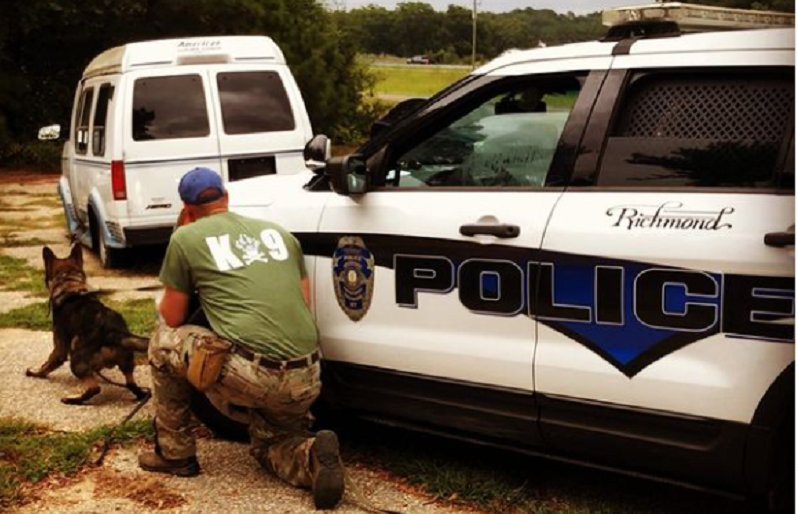
One of the magnificent realms of police work involves “working dogs.” Not meant as a euphemistic reference to humans with extreme dedication to duty, but the literal kind: four-legged creatures who enjoy catching bad guys and sleuthing out narcotics and detecting explosive devices and recovering missing persons like it’s a walk in the park. Afterward, it is.
Other canine cop specialties include arson investigation unit dogs sniffing out accelerants, indicating the point of ignition. Growing in popularity and validity regarding the enormous stress levels encountered by law enforcement personnel are therapy dogs.
“Finley,” a police canine providing comfort not only for police staff but also gets to tour his community of Lancaster, NY, and put smiles on citizens’ faces, has his own Insta page chock full of happy encounters with humans.
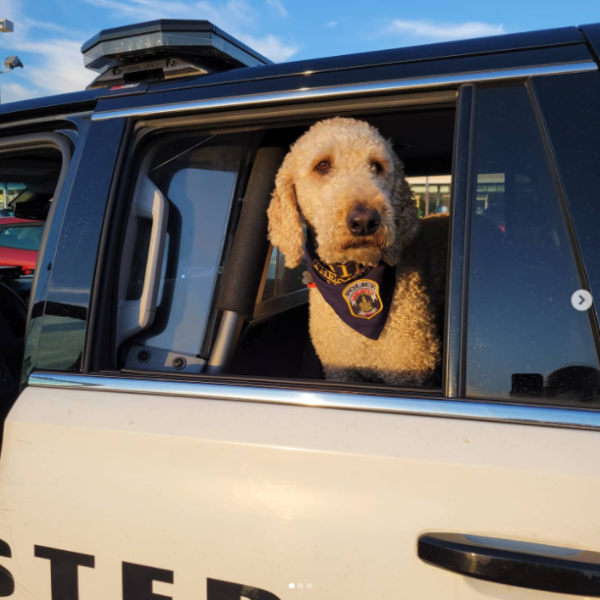
(“Finley” the therapy dog. Photo courtesy of the Lancaster Police Department.)
As a dog enthusiast in general, I invest time studying canines of all breeds. Like humans, each dog has its persona and appearance and skillsets impressing onlookers—especially their owners and people with whom they associate.
When in service as a cop, I marveled at the enormous discipline and devotion to duty that certified police canines exude, surely making their assigned police handlers beyond proud. Like our title says, these canine cops demonstrate gloriously the oath to serve and protect (especially their assigned handler), and when the mission is accomplished, fave treats and/or an attaboy rub-fest is surely granted these four-legged cops.
Given the customary 24/7/365 familial context of law enforcement canines working and residing with their human counterparts, the bonds exceed the boundaries and regimens of duty hours. Most police agencies provide the canine handlers with kennels and all the accouterments necessitated by responsible dog ownership. Veterinary bills are mostly budgeted. Sometimes, we were recipients of charitable provisions from city residents and merchants in the form of vittles and doggy chew toys.
Although police-based TV shows sometimes depict police canine teams in excerpts here and there, the pre-duty routine that most canine cops keep is a blessing to behold: police handlers start the duty day with “Ready to go to work?” reveille, to which the police dog would unambiguously excite.
My department’s canine contingent consisted of one canine team per squad; therefore, a police service dog was on duty at all times, with rare exceptions (vacation days, training ventures, vet care, etc.). Besides state Criminal Justice Standards and Training Commission (CJSTC) mandates, our department’s command staff required additional canine unit disciplines outlined in policy manuals.
Yet there’s more. The police canine teams I ever worked with in my career also did their own thing, meaning they’d hold spontaneous field training, asking for volunteers from the general squad of officers. As a dog lover, I threw myself in the mix of these midnight-shift training ventures (counting my fingers when scenarios were concluded). Most often, it was me hiding someplace in the dead of night and the dog found me. Never failed.
More-structured in-service training entailed a volunteer “suiting up” in custom-made sheathing pieced together looking like the Michelin Manprotecting but impeding the mobility of the wearer (other than a mild trot).
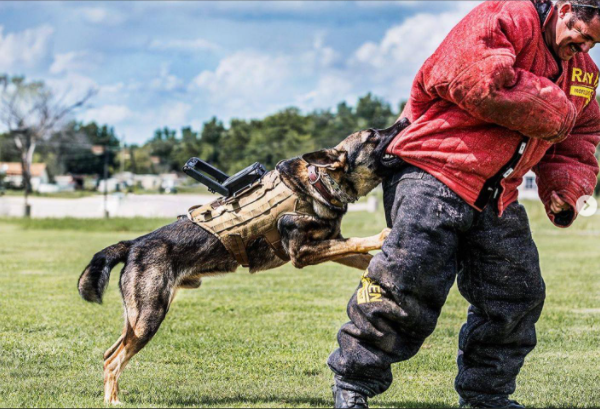
(Photo courtesy of K9s United.)
I can tell you first-hand, they don’t refer to these dogs as “fur rockets” for nothing. Footage of police dog training and human volunteer “bad guys” exhibit the acute focus and determination of these animals. And if they somehow miss the mark by a hair, they never surrender and regroup until success is accomplished (the bad guy down and done). Although I’ve never observed any, I am almost positive these dogs have built-in jet-packs.
Speaking of flying dogs, law enforcement canines are also trained/acclimated to go airborne in helicopters, training for pre-deployments on the ground by flying to distant lands for the sake of expediency in any investigative mission. Yes, pilot goggles included:
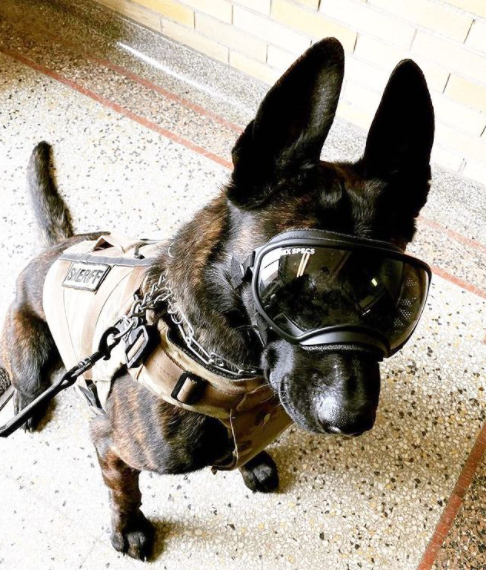
(Photo courtesy of the Police K9 Association.)
All of my agency’s police canines were born and trained in the United States—most performed exceptionally well. Only one was a tad different, seemed extremely anxious, and barked incessantly. Its assigned handler was a well-rounded, vastly experienced, cop with a stoic disposition. Retraining was the tall order, especially given that police service dogs and inherent certification achievements are not inexpensive.
Remediation ameliorated the hiccups, and that boy worked the zones well, subsequently retiring happily in its handler’s home (the norm in police canine realms).
Although I took Spanish in college, it was during the midnight shift I learned some German—our canine corps used German cues to instruct the service dogs, all German Shepherds at that time. We’ve since added the Belgian Malinois breed among the unit.
Since most law enforcement agencies in America are considered small, and not necessarily adequately monetized to purchase a police canine, mutual aid agreements are the go-to when a PD without a dog needs one on a scene. Ordinarily, the neighboring sheriff’s office obliges.
The National Police Association has been a steady provider of donations allocated to modest-sized police departments lacking a police dog but committed to having one among its cadre of cops.
Besides the police canine unit in my department, I follow other police agencies’ canine corps. For a few years now, I witnessed the growth and bonding experience between cops and their assigned canine partners. In particular, K9 Kota (now retired) and Police Officer M. Lyman with the Raleigh Police Department in North Carolina perfectly illustrate everything we are discussing herein.
One of the K9 unit’s latest training sessions was posted on Saturday, and it involved two police dogs flanking and following every cue from their human counterpart. Notice the synchronicity and acute attention to hand signals and body cues and close-proximity pace; it is fascinating to watch.
Police canines come in all types and specialties. For example, the Raleigh PD has among its canine corps Knox, a patrol dog; Jakko, a patrol dog; and Peppers, a bomb-sniffing dog.
In my area, the Pasco County Sheriff’s Office has a group of bloodhounds among its contingent of canine cops: “Missing people are the most common call our bloodhounds respond to in Pasco. Their ability to track specific scents even with time delays has been instrumental in finding missing people and returning them to their loved ones.”
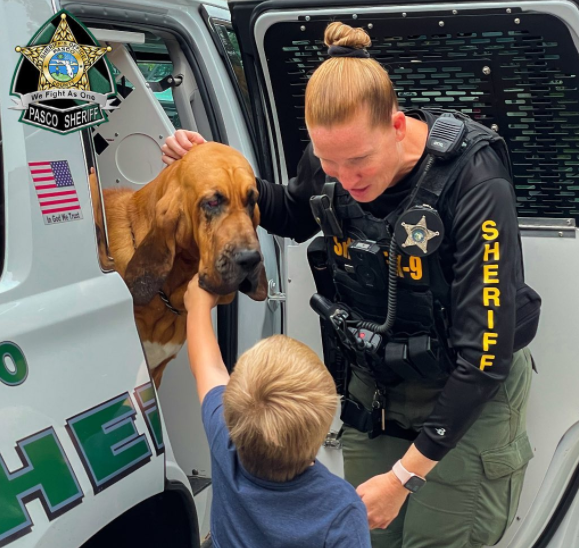
(Photo courtesy of the Pasco County Sheriff’s Office.)
Incidentally, March 13 is National K9 Veterans Day, honoring service dogs who spent days on duty making a difference in society’s villages, towns, cities, counties across America. Akin to human counterparts who endure years of sworn service, chronically confronting unimaginable perils, police canines fulfill the I’ve got your six pledge like it’s no one’s business. Here’s one of myriad examples:
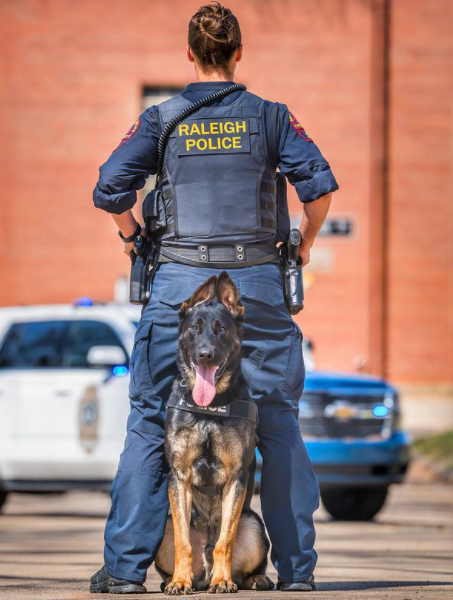
(Photo courtesy of Raleigh Police Canine Officer M.L. Lyman.)
An officer with the Amherst Police K9 unit described the diligence of K9 Marvin, which applies to all police service dogs: they “take on tasks like Marvin…give 100% effort, 100% of the time…even when it’s 100% unnecessary!”
After all their hard work, often into overtime, police canines are poised for din-din.
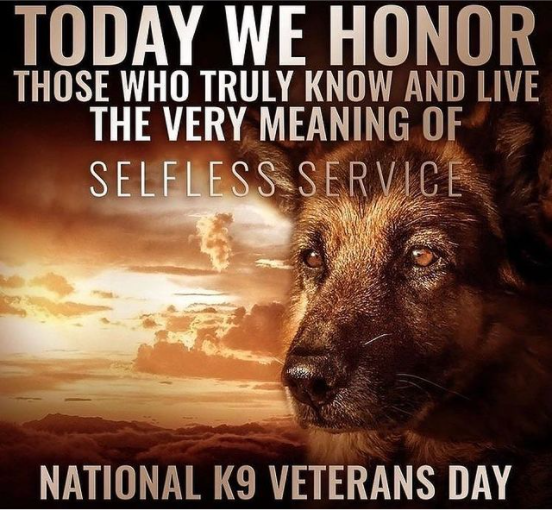
(Photo courtesy of the Police K9 Association.)
Watch any police canine team, and you’ll inevitably witness the definition of mutual respect and adoration. Invariably, police canines are unfailingly devoted to the human handler’s every nuance, hyper-focused on his/her face and verbal commands.
So, to all the police service dogs who take to the streets, catch bad guys, sniff out narcotics, detect explosive devices, and recover missing persons, hats off to you all for dedicated duty. As a police canine handler buddy would note about these animals scoring wins: “’Four’ sure, these furry rockets always get their man!”